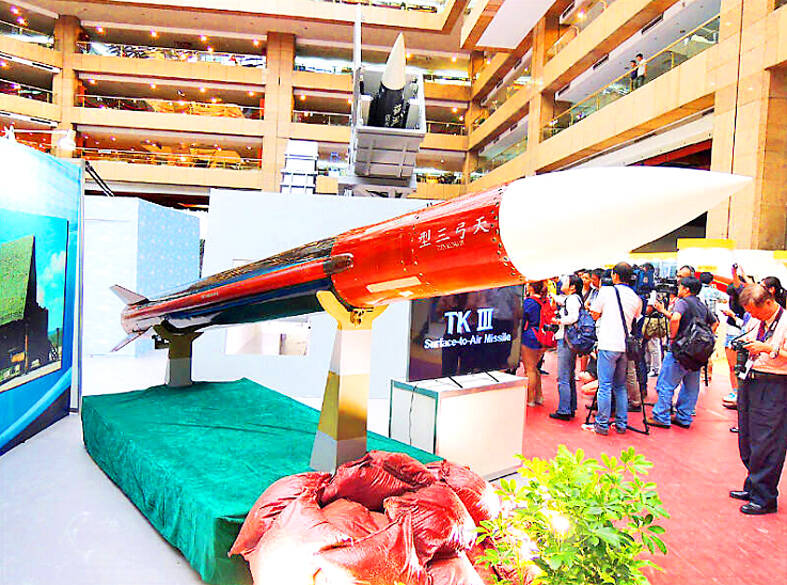Amendments to the National Security Act (國家安全法) that stiffen penalties for companies that supply products to the military using Chinese parts went into effect on Friday.
The amendments to articles 11 and 12 of the act aim to prevent defense contractors from providing the military with China-made goods using explicit bans and heavy fines, the Ministry of Justice said.
Under the updated Article 11, those who provide China-made goods or services to the military face one to seven years in prison and up to NT$30 million (US$953,137) in fines.

Photo: Lo Tien-pin, Taipei Times
Under changes to Article 12, people who falsify the provision of military arms, munitions or other materiel face three to 10 years in prison and fines of NT$5 million to NT$50 million.
Amendments to Article 18 also set the High Court as the court of first instance for charges related to fostering clandestine organizations, to leverage the national security experience and expertise of the court and the Taiwan High Prosecutors’ Office, the Ministry of Justice said.
The amendments specify that the High Court convene a specialized court to oversee such cases.
The ministry said the amendments were needed to address the sensitive and confidential manner of national security cases.
It said it has already discussed with the Taiwan High Prosecutor’s Office about training personnel and obtaining equipment needed to oversee cases focused on national security matters.
When necessary, the first and second appellate courts and the prosecutors under those courts would work in teams to broaden the judicial system’s ability to handle national security cases, it said.
To prevent foreign powers from funding political parties or candidates, as part of efforts to undermine the legitimacy of elections and erode the nation’s democratic systems, the ministry said it is prioritizing efforts to combat foreign election influence attempts.
New Taipei City’s Ciaotou District (橋頭) Prosecutors’ Office earlier this week uncovered alleged efforts by China’s Taiwan Affairs Office to influence voters in January’s election to support specific candidates by offering paid trips to China.
The justice ministry urged the public to beware of such attempts and to avoid them to prevent inadvertently contravening the law.

CHAOS: Iranians took to the streets playing celebratory music after reports of Khamenei’s death on Saturday, while mourners also gathered in Tehran yesterday Iranian Supreme Leader Ayatollah Ali Khamenei was killed in a major attack on Iran launched by Israel and the US, throwing the future of the Islamic republic into doubt and raising the risk of regional instability. Iranian state television and the state-run IRNA news agency announced the 86-year-old’s death early yesterday. US President Donald Trump said it gave Iranians their “greatest chance” to “take back” their country. The announcements came after a joint US and Israeli aerial bombardment that targeted Iranian military and governmental sites. Trump said the “heavy and pinpoint bombing” would continue through the week or as long

TRUST: The KMT said it respected the US’ timing and considerations, and hoped it would continue to honor its commitments to helping Taiwan bolster its defenses and deterrence US President Donald Trump is delaying a multibillion-dollar arms sale to Taiwan to ensure his visit to Beijing is successful, a New York Times report said. The weapons sales package has stalled in the US Department of State, the report said, citing US officials it did not identify. The White House has told agencies not to push forward ahead of Trump’s meeting with Chinese President Xi Jinping (習近平), it said. The two last month held a phone call to discuss trade and geopolitical flashpoints ahead of the summit. Xi raised the Taiwan issue and urged the US to handle arms sales to

State-run CPC Corp, Taiwan (CPC, 台灣中油) yesterday said that it had confirmed on Saturday night with its liquefied natural gas (LNG) and crude oil suppliers that shipments are proceeding as scheduled and that domestic supplies remain unaffected. The CPC yesterday announced the gasoline and diesel prices will rise by NT$0.2 and NT$0.4 per liter, respectively, starting Monday, citing Middle East tensions and blizzards in the eastern United States. CPC also iterated it has been reducing the proportion of crude oil imports from the Middle East and diversifying its supply sources in the past few years in response to geopolitical risks, expanding

Pro-democracy media tycoon Jimmy Lai’s (黎智英) fraud conviction and prison sentence were yesterday overturned by a Hong Kong court, in a surprise legal decision that comes soon after Lai was jailed for 20 years on a separate national security charge. Judges Jeremy Poon (潘兆初), Anthea Pang (彭寶琴) and Derek Pang (彭偉昌) said in the judgement that they allowed the appeal from Lai, and another defendant in the case, to proceed, as a lower court judge had “erred.” “The Court of Appeal gave them leave to appeal against their conviction, allowed their appeals, quashed the convictions and set aside the sentences,” the judges